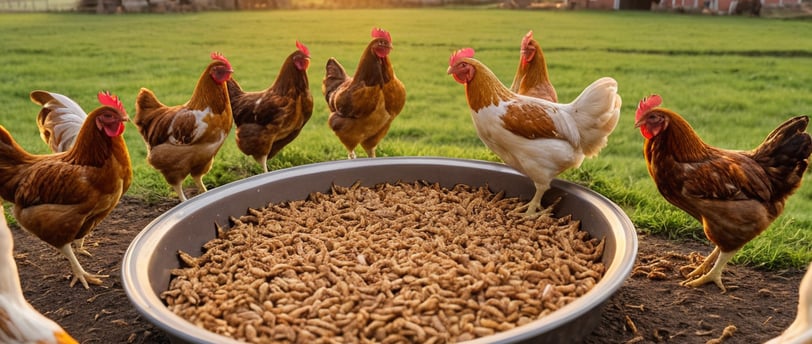Black Soldier Fly as a Sustainable Protein Source
Medhat Gad
10/17/20242 min read


Introduction
Black soldier fly (BSF) larvae have emerged as a promising and sustainable alternative to traditional protein sources, such as fishmeal and soybean meal. Their ability to efficiently convert organic waste into high-quality protein makes them a valuable resource for animal feed and other applications. This report explores the nutritional value, environmental benefits, and potential challenges associated with using BSF larvae as a protein source.
Nutritional Value
BSF larvae are a rich source of protein, with protein content ranging from 35% to 45% of their dry weight. They also contain essential amino acids, including lysine, methionine, and tryptophan, which are crucial for animal growth and development. Additionally, BSF larvae are a good source of healthy fats, including omega-3 fatty acids, which are beneficial for animal health.
Environmental Benefits
Waste Reduction: BSF larvae can efficiently convert organic waste, such as food scraps and livestock manure, into valuable biomass, reducing the amount of waste that ends up in landfills.
Nutrient Recycling: BSF larvae can recover nutrients from organic waste, such as nitrogen and phosphorus, which can be used to fertilize crops.
Greenhouse Gas Reduction: BSF larvae can help reduce greenhouse gas emissions by diverting organic waste from landfills, where it would decompose and produce methane.
Sustainable Protein Source: BSF larvae can be produced on a large scale without the same environmental impacts as traditional protein sources, such as fishmeal and soybean meal.
Challenges and Considerations
Production Costs: The initial investment in BSF farming equipment and facilities can be high. However, the potential for revenue from selling BSF larvae and their byproducts can offset these costs.
Odor Control: BSF larvae can produce strong odors, particularly when reared in large quantities. Proper ventilation and odor control measures are essential to mitigate this issue.
Quality Control: Ensuring the consistent quality of BSF larvae is important for their use as a protein source. This requires careful monitoring of production processes and quality control measures.
Consumer Acceptance: As a relatively new food source, BSF larvae may face challenges in terms of consumer acceptance. Education and awareness campaigns can help to address this issue.
Conclusion
Black soldier fly larvae offer a sustainable and nutritious protein source with significant environmental benefits. Their ability to efficiently convert organic waste, reduce greenhouse gas emissions, and provide a valuable source of protein makes them a promising alternative to traditional protein sources. While there are challenges associated with BSF farming, the potential rewards in terms of environmental sustainability and economic benefits make it a worthwhile pursuit.
Sustainability
Transforming waste into sustainable protein solutions daily.
Innovation
Impact
+1(438)-927-5905
© 2022. All rights reserved.
info@canadacleantechs.com
